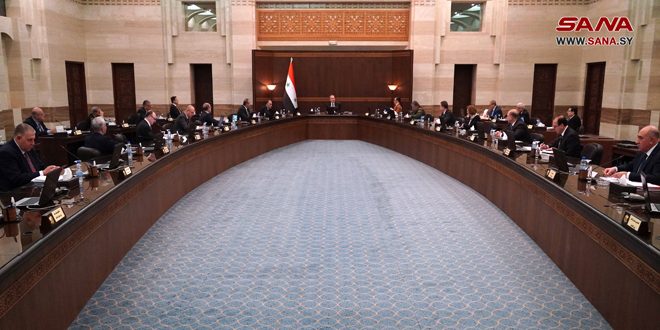Damascus-SANA
The Council of Ministers discussed the mechanisms of distributing diesel to all sectors in the governorates and the available quantities. Fairness in distribution was emphasized. In this context, the reality of oil derivatives supplies and the shortage in them were discussed, and the proposed government measures to ensure the continuation of the distribution of agricultural and heating diesel, in addition to work Basic sectors such as bakeries, hospitals and various basic public services, in parallel with the rationalization of the use of oil derivatives and energy in public institutions and agencies.
The council also discussed, in its weekly session today, chaired by Eng. Hussein Arnous, a draft legislative instrument amending Decree 310 of 2020, which includes linking incentives and rewards to scientific and research production. Depending on the activity of the teaching staff member, the incentives may reach 300% for a faculty member, 200% for a technical staff member, and 100% for a teaching assistant. With the aim of encouraging and motivating members of the teaching staff and university workers and attracting competencies, which will reflect positively on the proper functioning of the educational process and thus raise the level of graduates.
The Council of Ministers asked all relevant ministries to take the highest levels of safety and public safety when implementing projects, considering that the executive and supervisory authorities and contractors bear direct legal responsibility for any defect in implementation or harm affecting any citizen resulting from negligence or negligence in the performance of work.
Eng. Arnous directed the ministries to review the legislation issued since 2015 until now in terms of their positive repercussions on the economic and service realities, the development of work mechanisms, and the proposal for the necessary amendment to develop these legislations in a way that serves the citizen and the public interest in the first place, stressing at the same time the strict control over the distribution of subsidized materials and accountability Violators and the necessity of direct follow-up to the implementation of agreements and memorandums of understanding signed with friendly countries in order to achieve mutual benefit.
In addition, the Council reviewed the plan to develop the Al-Ghab region, the agricultural and industrial projects that were established in it, and the measures taken to improve the reality of agricultural and industrial performance and secure the requirements for agricultural work. Natural resources, securing production inputs locally, replacing imports, increasing interest in agricultural manufacturing and marketing, increasing the income of rural families, creating income-generating activities, and improving the service reality in the region.
The Council also discussed the possibility of benefiting from the barren lands adjacent to the mountain range in the Al-Ghab region, and converting them into residential areas in light of the determinants of the national framework for regional planning, which contributes to limiting encroachments on agricultural lands in the region.
The Council of Ministers studied a draft legislative instrument to exempt a number of imported basic materials from additional fees for a period of one year, namely (wheat, raw sugar, dry yeast, crude vegetable oil, soybean seeds), with the aim of reducing import costs, achieving the factor of competition and covering the needs of the local market from various sources. Basic materials and commodities and reduce their prices.
The Council approved the mechanism prepared by the Ministry of Administrative Development related to the recent competition for the laid-offs, as a two-month period was given to complete the supporting papers necessary for appointment, and to direct the concerned authorities to secure the required financial appropriation to complete the contract with the laid-offs.
The Cabinet approved a number of priority service, development and investment projects in a number of governorates.
Follow SANA's news on Telegram https://t.me/SyrianArabNewsAgency

